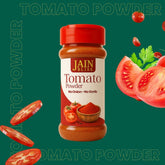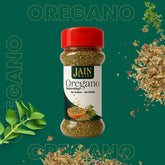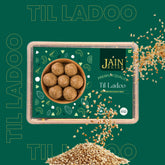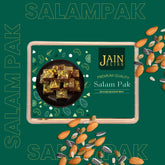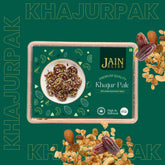Why Jain Food? The Spiritual and Ethical Path of Jain Food
Why Jain Food? Understanding the Connection Between Jainism and Food Choices
Food is not just sustenance in Jainism; it is a deeply spiritual practice. The Jain approach to food is rooted in their core principles of non-violence (Ahimsa), self-control (Brahmacharya), and reverence for all living beings. Jain food isn’t just about what’s consumed but also about how, when, and why it’s prepared and eaten. Here's why Jain food holds such significant importance:

1. Non-Violence (Ahimsa) - A Foundation of Jain Food
At the heart of Jainism is the principle of Ahimsa (non-violence), which means avoiding harm to any living being, whether human, animal, or even the smallest of microorganisms. This principle shapes what Jains eat. Jain food is strictly vegetarian, and in many cases, it is vegan, as Jains believe in minimizing harm to all living creatures.
No Animal Products:
Jains avoid all forms of animal products, including meat, fish, eggs, and even certain dairy products like those obtained from cows in non-humane ways.
Microorganisms:
To avoid harming even the smallest of life forms, Jains are mindful of foods that may contain invisible life, such as yeast, fermented items, or any food that requires extensive handling that might disturb microbes.
2. Pure Food and Its Spiritual Significance
In Jainism, food is seen as more than just physical nourishment; it is considered a way to attain spiritual purity. Food prepared with love, respect, and care is believed to promote purity of the soul and mind.
Mindful Preparation:
Jain food is made with care, ensuring that all ingredients are fresh, pure, and free from harm. Preparation is a meditative process, and Jains ensure that no harm is caused to the food, the cook, or anyone who will consume it.
Fresh and Simple Ingredients:
Jain food typically uses fresh, seasonal vegetables, grains, and legumes, making it not only spiritual but also healthy. The simplicity of the food reflects the Jain ideal of living a life that is modest, free of excess, and focused on inner contentment.
3. Avoidance of Root Vegetables
One of the distinctive features of Jain cuisine is the avoidance of root vegetables, such as potatoes, onions, and garlic. This is because uprooting these plants kills the entire plant, which violates the Jain principle of non-violence. Additionally, these root vegetables are believed to contain more microorganisms, which may inadvertently cause harm.
Why No Root Vegetables?
Jains believe that by uprooting a plant, many small life forms are harmed, which directly contradicts the Jain philosophy of Ahimsa. Instead, Jains opt for leafy greens, fruits, and vegetables that grow above the ground.
4. Fasting and Self-Discipline
Food also plays an essential role in practicing Brahmacharya (self-discipline) in Jainism. Many Jains engage in fasting or partial fasting, particularly during important religious observances like Paryushana. These fasting practices help to cleanse the body and mind and increase self-control. By reducing food intake, Jains aim to curb material desires and focus more on spiritual growth.
Fasting for Spiritual Growth:
Fasting is seen as a way to build inner strength, reflect on one's actions, and cultivate a deep connection to the soul. During fasting, Jains often restrict themselves to eating only certain foods or consuming food at specific times of the day.
5. The Concept of Food and Karma
In Jainism, food and its consumption are closely linked to the concept of Karma. Every action, including what we eat, generates karma, which can either bind the soul or help liberate it. By choosing food that is in alignment with the values of non-violence, purity, and self-discipline, Jains believe they can reduce the accumulation of negative karma and move closer to liberation (Moksha).
Avoiding Overeating:
Jains also practice moderation in eating, as overeating is seen as indulging in unnecessary desires and attachments, which increase negative karma. The focus is on eating only what is necessary for sustenance and avoiding excess.
6. Sattvic Food - The Path to Purity
Jain food is considered Sattvic, which means it is pure, clean, and promotes clarity of mind and peace. Sattvic food is thought to help in cultivating a peaceful and positive state of mind, which is essential for spiritual practices and mental well-being.
No Fermented or Overripe Foods:
To maintain purity, fermented or overripe foods are avoided because they may contain harmful bacteria or microorganisms that might have caused harm to life forms. Fresh, simple, and wholesome food is the ideal choice for maintaining spiritual purity.
7. Seasonal and Local Choices
In Jainism, there is a strong emphasis on eating locally grown and seasonal foods. This practice aligns with the Jain belief in respecting nature and its cycles, reducing the environmental impact of long-distance food transport, and avoiding foods that might not be in harmony with the local ecosystem.
Connection to Nature:
Eating in tune with nature’s cycles is seen as a way of living in harmony with the Earth, fostering respect for natural resources, and reducing waste.
8. Jain Food and the Environment
By choosing plant-based food, avoiding overconsumption, and minimizing food wastage, Jains contribute to a more sustainable and eco-friendly way of life. Jainism encourages practices that are not only good for the individual but also beneficial for the planet.
Eco-Friendly Practices:
Many Jains also follow sustainable farming methods and avoid processed or packaged foods to reduce environmental impact, contributing to a greener, more ethical world.
Conclusion:
Jain food is more than just a dietary choice; it is a way of life. By focusing on non-violence, purity, self-discipline, and compassion, Jains not only nourish their bodies but also nurture their souls. Jain food is a reflection of their values—simplicity, humility, and respect for all living beings. For those who wish to adopt a lifestyle rooted in kindness, mindfulness, and spirituality, Jain food provides a perfect model for eating with purpose, awareness, and deep respect for life.
FAQs
1. What are the core principles that influence Jain food choices?
Jain food choices are deeply rooted in the principles of non-violence (Ahimsa), purity, self-control (Brahmacharya), and respect for all living beings. These principles guide what, how, and when food is prepared and consumed in Jainism.
2. Why do Jains avoid root vegetables in their diet?
Jains avoid root vegetables like potatoes, onions, and garlic because uprooting these plants harms the entire plant and any microorganisms it may contain, which violates the Jain principle of non-violence (Ahimsa).
3. What is the significance of fasting in Jainism and its connection to food?
Fasting is an important practice in Jainism that promotes self-discipline (Brahmacharya). It helps cleanse the body and mind, curbing material desires and focusing on spiritual growth. Jains often fast during significant religious events like Paryushana.
4. How does Jainism view the connection between food and karma?
In Jainism, food choices are linked to karma, with the belief that consuming food aligned with non-violence, purity, and self-discipline reduces negative karma. This practice helps in the pursuit of liberation (Moksha).
5. Why is Sattvic food emphasized in Jainism?
Sattvic food, considered pure and clean, is emphasized in Jainism because it promotes clarity of mind, peace, and spiritual well-being. Such food is simple, fresh, and free from fermentation or overripe conditions, maintaining spiritual purity.





